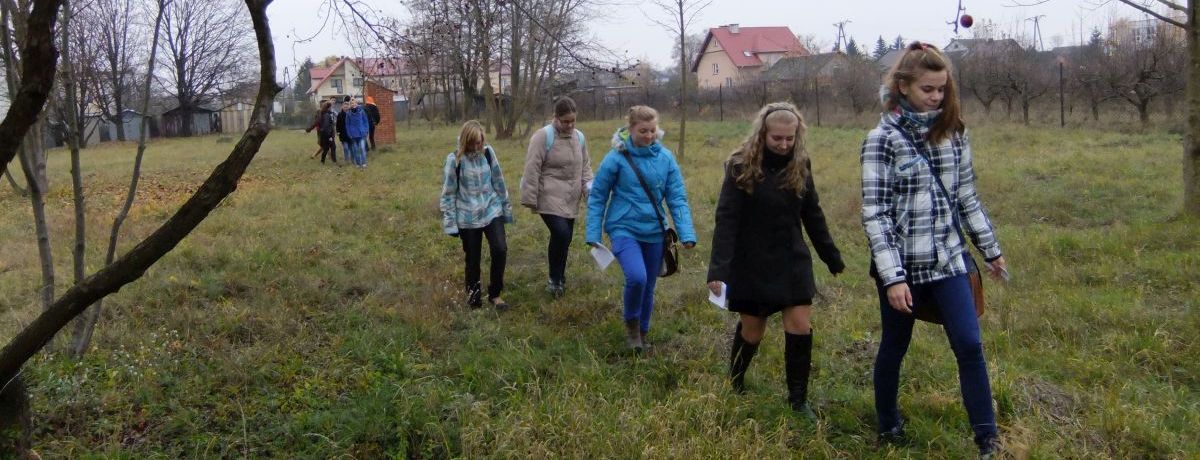| 2012 |
Annopol
Town School Complex


| 2012 |
Even though some students have lived here since they were born, it was the first time ever that they went to the cemetery. The site is fenced, there is a small monument from hollow bricks and many falled matzevot covered with turf and grass, pieces of rubbish scattered around. This view of a forgotten Jewish cemetery has become an impulse to act.
Students from the School Complex in Annopol, inspired by their participation in the School of Dialogue workshops, raked leaves and cleaned up the rubbish at the Jewish cemetery in Annopol. As Kasia said, “Because of the workshops, a friend of mine and I decided to find out what there is in Annopol that is connected to Jews. We want to clean up, tidy up and take care of the Jewish cemetery in Annopol. We also want to write an article about the Jewish community that once lived here.” During workshops, together with their third-year junior high school friends, they learnt about Jewish history and culture, explored the history of their town and discussed the issue of multiculturalism and preservation of memory.
The students also met Wiesław Liwiński, the mayor of Annopol, an expert on history of the Jews from a nearby Kraśnik. The guest assisted students in their idea of commemorating Jews of Annopol, shared his personal experience and told about help he provided to a person who sought his Jewish roots in Annopol.
Before the war, Jews constituted approximately 70% of the town’s population. They lived in Annopol from the 17th century and were mainly merchants and craftsmen. In the 19th century, there were two synagogues in the town: the older synagogue made of wood, north from the market, and the newer one made of brick, in Świeciechowska Street. There were religious and secular primary Jewish schools operating in the town and a small yeshiva for these who planned to continue their education at the rabbinical school in Lublin.
Both Zionist and conservative parties operated here. In spring 1940, Germans established a ghetto in Annopol, which was liquidated during the same year and the ghetto inmates were transported to the death camp in Bełżec.
Young people decided to commemorate Jews from Annopol and organised a walking tour following their footsteps in the pre-war town. They invited friends from their school to this event. They set off at a November afternoon. The tour participants found out how many Jews lived in Annopol before the war, what their occupation was, how neighbors got along and where the ghetto was. They saw wooden beams in a deteriorated building, that before were parts of a sukkah. We can only guess that the entrance was through the wooden doors upstairs where one glass is missing now. They also went where the synagogue once stood and to the former ghetto area.
The tour ended at the cemetery.
What is interesting, during the School of Dialogue workshops in Annopol, Mayor of the Municipality expressed his willingness to help students clean up the cemetery and to publish the information on the Municipality’s website. The School of Dialogue graduates may in future contribute to a good change. The words expressed by one of the program participants from Annopol confirm that such change has already taken place: “I need to say that a lot has changed after the workshops. I have deepened my knowledge as I was unaware that Jews once lived in my town, that a synagogue used to stand here andthere were two cemeteries.” The workshops made the students understand that what happens around them is upon them.
Because of the workshops, a friend of mine and I decided to find out what there is in Annopol that is connected to Jews. We want to clean up, tidy up and take care of the Jewish cemetery in Annopol. We also want to write an article about the Jewish community that once lived here.
Kamila, workshops participant

School:
Town School Complex
Students:
3rd year students
Teacher:
Barbara Kuś
Expert:
Wiesław Liwiński
Educators:
Anna Desponds, Beata Godlewska
School of Dialogue program in Annopol was made possible by the support from TRUDY and LESTER FAGEN, BETH and MICHAEL MOSKOWITZ, SUZI and DAVID SCHULLER, ROBIN and MEL SCHUMAN.
In appreciation to the Conference on Jewish Material Claims Against Germany (Claims Conference) for supporting this educational program. Through recovering the assets of the victims of the Holocaust, the Claims Conference enables organizations around the world to provide education about the Shoah and to preserve the memory of those who perished.

In appreciation to Friends of the Forum for supporting the School of Dialogue educational program.
